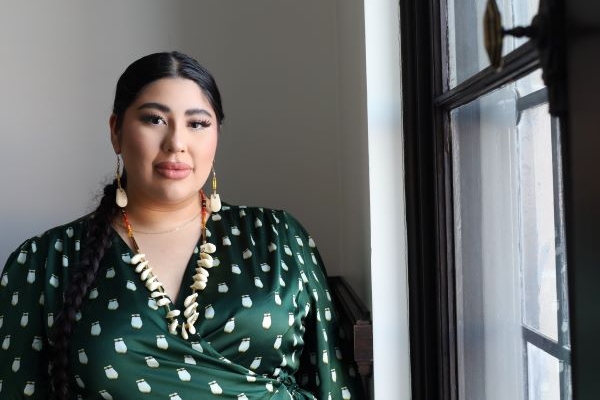
Finding her place
Heather O’Watch, who is receiving a Leadership Award at this year’s University of Saskatchewan (USask) Indigenous Achievement Week awards ceremony, is one of four youth delegates representing Canada at the Y7 Summit in Tokyo, Japan in April.
By Scott Larson for Johnson Shoyama Graduate SchoolHeather O’Watch, who is receiving a Leadership Award at this year’s University of Saskatchewan (USask) Indigenous Achievement Week awards ceremony, was on social media late last year when she noticed a post looking for applicants to represent Canada at the Y7 Summit in Tokyo, Japan in April.
“I thought this is right up my alley,” says O’Watch, who is in the middle of her Master of Public Policy through the Johnson Shoyama Graduate School of Public Policy at the University of Saskatchewan.
“But I had 48 hours to apply. I didn’t know if I had the skill set, but you don’t know unless you try.”
A week or so later O’Watch secured an interview and was accepted as one of four Canadian youth delegates to the Y7 Summit.
The Summit brings together youth delegates from the G7 member countries, the European Union, and guest countries to discuss and form policy suggestions in four specific areas: Economy, Digital, Global Health and Climate.
The Y7 Summit leads to the creation of an Y7 Communiqué that serves as the official youth recommendations to G7 leaders in advance of their international summit.
O’Watch says it’s a great chance to put what she is learning into action.
“There is a lack of Indigenous voices and representation at global levels,” she said. “The Y7 is extremely important to have opportunity not just myself, but other youth that aren’t in those spaces.”
Heather is a Nakoda and Cree woman from the Okanese First Nation located in Treaty 4 Territory. She also has paternal ties to Cegakin (Carry The Kettle) First Nation. When she was 10 her family moved to Regina where she later attended the University of Regina (U of R) in pursuit of a journalism degree before switching to the First Nation University of Canada (FNUniv) where she graduated with a degree in Indigenous Studies.
Along the way O’Watch worked in communications, journalism, community research and community development and policy. She’s been a strong advocate for Indigenous rights and higher education, serving on the U of R student union, FNUniv’s student association and the Canadian Federation of Students.
Her other work includes working with the Indigenous Youth Policy School through the Canadian Roots Exchange.
Heather was a youth participant for their 2022 Advocacy Week alongside other Indigenous youth. They met with federal MPs and ministers in advocating for Indigenous issues.
“I wanted to join initially as a participant, but felt I could also contribute to the sharing of my knowledge around policy to other youth and became a facilitator/teacher,” she said. “I teach once a week on a variety of topics related to enhancing Indigenous youths understanding on policy, the history of policy within Indigenous context and the importance of Indigenous knowledge and traditional aspects moving forward with policy.”
She is also a volunteer member on the Young Canadian Roundtable on Health. She is co-leading an Indigenous project on creating an Indigenous Health resource booklet that will help support and provide access to Indigenous youth on different health-related information.
So it's little wonder O’Watch has gravitated toward public policy, and has become a celebrated member of the indigenous student community at USask.
“I knew I wanted to get into a master's program,” she said. “And my main interest is broadening my passion for advancing Indigenous rights and human rights, and how public policy shapes and changes the way our communities thrive.
Her MPP studies allow her to combine her passion and advocacy for higher education and public policy. O’Watch has finished her coursework and will soon begin work on her thesis.
“I am currently shaping out my thesis proposal but hoping to understand more deeply about how universities/higher education institutes work with Indigenous communities in decolonizing their policies and practices.”
Part of her motivation comes from her current work with Yukon University as a policy analyst.
Heather said it broadened her knowledge of the possibilities for self-government.
“I just so happen to focus with Yukon communities where there are 11 self-governing communities and I hope I can understand a lot more about their relationship with universities in their region.”
She’ll use the knowledge she has gained in preparing for the Y7 Summit where she is leading the health track and is the diversity and inclusion co-ordinator.
Every Sunday for the last month she has been in policy negotiations with the other Y7 Summit delegates working on their official communiqué.
“There’s only 30 of us, so the more we can equitably and transparently voice and support others that aren’t there is extremely important to me,” O’Watch said.
She said there haven’t been many Indigenous students going to the Y7 Summit, and no one to her knowledge from Saskatchewan has gone as a youth delegate.
Once the Y7 Summit is over, O’Watch will head to the United Nations in New York for the permanent forum on Indigenous issues. She will work as the only Canadian advocate with the Indigenous Peoples Rights International organization.
Heather is the data and documentation officer and her role is to organize, report and advocate for the advancement of Indigenous rights.
“And also to uplift and support the voice of Indigenous peoples around the word when it comes to the criminalization and impunity that they face in their states or countries,” she said.
“My motivation is to take up spaces in places that haven’t had someone like me in there,” O’Watch said.
“I just turned 28 and I hope in 10 years’ time that I can continue to make an impact.”

